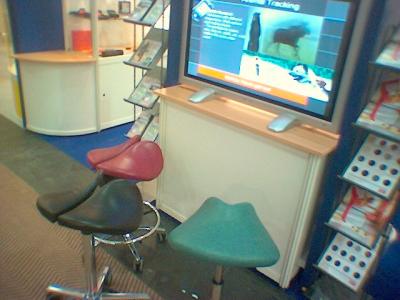Mittwoch, 22. März 2006
What`s the Meaning of Localization in the Age of Virtuality?
mobile_freak, 17:05h
Today I sent my colleague (who was at home) this video of our new office.
our_office (mp4, 450 KB)
This activity caused a line of reasoning which was not new but still seemed interesting to me for my situation. I was wondering if it would at all be necessary for my colleague to be physically present.
With a slight improvement of our technology (not a problem nowadays) I could wear a helmet with a headset and a webcam attached to it. My colleague could see what I see (CCSWIS) and we could talk to each other. Thus, he could tell me what he wants to see and could tell me what furniture I should move to which corner. From this perspective, it would not at all be necessary for my colleague to be there.
There is one apparent disadvantage, of course: He would not be able to help me carrying tables around. But let`s move into some visionary age of technology and let`s say we had constructed a robot. This robot would perceive the main input streams relevant for (human) action (in our case this would be visionary and auditory input and some sort of haptic feedback (so the robot would not crush the laptop she is carrying around)). This input would be transferred to a virtual suit in my colleagues appartement. In the other direction the robot would mimic every movement my colleague is making in his suit. From this perspective, it would not at all be necessary for my colleague to be there. Even more, it would have certain advantages since the robot would be able to lift heavy boxes which would be to heavy for us.
If we go further down this road this poses the question: Why setting up a common office at all? The advantages are apparent: The university would not have to pay for a huge new building because of the overgrowding circumstances (for the saved rent for this building it could buy a decent virtual suit for all members of the faculty), we would save money because we would not have to buy bycicles, cars or tickets for public transport, we would save transportation time and the diminished traffic would also be good for our environment (which, on the other side, we might not need anymore).
So, are we heading into a completely disembodied society? I would forecast that the disembodiment of our society will certainly increase more and more. This might, however, aggravate a problem which is already apparent for many western societies. While having all kinds of strange forms of cybersex is certainly possibly in such a scenario, the procreation of children will be a difficult task. For this vital aspect we still seem to stick to our biological material and probably cannot bound to be physically present.
our_office (mp4, 450 KB)
This activity caused a line of reasoning which was not new but still seemed interesting to me for my situation. I was wondering if it would at all be necessary for my colleague to be physically present.
With a slight improvement of our technology (not a problem nowadays) I could wear a helmet with a headset and a webcam attached to it. My colleague could see what I see (CCSWIS) and we could talk to each other. Thus, he could tell me what he wants to see and could tell me what furniture I should move to which corner. From this perspective, it would not at all be necessary for my colleague to be there.
There is one apparent disadvantage, of course: He would not be able to help me carrying tables around. But let`s move into some visionary age of technology and let`s say we had constructed a robot. This robot would perceive the main input streams relevant for (human) action (in our case this would be visionary and auditory input and some sort of haptic feedback (so the robot would not crush the laptop she is carrying around)). This input would be transferred to a virtual suit in my colleagues appartement. In the other direction the robot would mimic every movement my colleague is making in his suit. From this perspective, it would not at all be necessary for my colleague to be there. Even more, it would have certain advantages since the robot would be able to lift heavy boxes which would be to heavy for us.
If we go further down this road this poses the question: Why setting up a common office at all? The advantages are apparent: The university would not have to pay for a huge new building because of the overgrowding circumstances (for the saved rent for this building it could buy a decent virtual suit for all members of the faculty), we would save money because we would not have to buy bycicles, cars or tickets for public transport, we would save transportation time and the diminished traffic would also be good for our environment (which, on the other side, we might not need anymore).
So, are we heading into a completely disembodied society? I would forecast that the disembodiment of our society will certainly increase more and more. This might, however, aggravate a problem which is already apparent for many western societies. While having all kinds of strange forms of cybersex is certainly possibly in such a scenario, the procreation of children will be a difficult task. For this vital aspect we still seem to stick to our biological material and probably cannot bound to be physically present.
... link (1 Kommentar) ... comment
Dienstag, 14. März 2006
wlan beitrag
mobile_freak, 19:11h
direkt vom qtek ins cbit netz
angenehme stuehle
es scheint (bei der momentanen einstellung) nicht moeglich zu sein bilder oder dateien vom pda ins dieses blog zu laden
lesen geht ziemlich gut bei diesem blog. tippen einigermassen. aber deutlich aetzender als zuhaus. fuer die sms generation ev. kein problem
nachträglich hier nun die Stuehle:

angenehme stuehle
es scheint (bei der momentanen einstellung) nicht moeglich zu sein bilder oder dateien vom pda ins dieses blog zu laden
lesen geht ziemlich gut bei diesem blog. tippen einigermassen. aber deutlich aetzender als zuhaus. fuer die sms generation ev. kein problem
nachträglich hier nun die Stuehle:

... link (0 Kommentare) ... comment
Montag, 13. März 2006
Spuren im Schnee
mobile_freak, 23:31h

... link (0 Kommentare) ... comment
... older stories